欧美文化概论论文
欧美文学经典论文1200字_欧美文学经典毕业论文范文模板

欧美文学经典论文1200字_欧美文学经典毕业论文范文模板欧美文学经典论文1200字(一):欧美及亚非经典文学中精神文化浅探论文文学是在语言文字最初的交流和记录功能之上发展、升华出来的思想情感的表达方式,是人们对客观世界的认识和主观感受的外在流露。
由北京大学出版社出版,涂险峰、张箭飞主编的《外国文学》一书,按照文学本身的发展规律,分别以时序和国家地区为标准,遴选了一批在历史上各个时期的各个民族和地区最具代表性的作家和作品,全方位地勾画出一幅世界文学发展地图,并提炼出其中的精华部分呈现给读者。
本书是中国文学工作者和爱好者了解、研究世界其他国家和地区文学、文化的极富价值的图书。
本书中篇幅最长、着墨最多的是欧美部分。
欧洲文学的源头和第一个高峰是古典时期的古希腊和古罗马文学,这一时期的文学作品为整个西方文学的发展奠定了基调。
无论是《荷马史诗》中的英雄主义、悲剧《俄狄浦斯王》里人与命运的抗争,还是伟大的罗马诗人维吉尔作品中对人类情感的真实表现,都是直至现在仍被不断借鉴的主题。
欧洲文学的第二个高峰出现在文艺复兴时期。
标志文艺复兴发端的是意大利诗人但丁的《神曲》,作品所流露出的反对中世纪的蒙昧主义,追求真理的思想,成了文艺复兴的第一声号角,也对欧洲后世的诗歌创作产生了深远的影响。
此后300多年的时间里,欧洲涌现出了一大批伟大的作家和传世的名作。
无论是薄伽丘的《十日谈》、拉伯雷的《巨人传》,还是塞万提斯的《堂吉诃德》,无不体现着人文主义的精神,为欧洲和世界开启了一个文化的新时代。
而这其中的集大成者是莎士比亚,他在文化上的成就和地位至今无人超越。
流传下来的37部戏剧,154首十四行诗,是留给全人类的一笔巨大的文化遗产。
近代以后,歐洲文学在社会进步的推动下不断向前发展,从新古典主义到浪漫主义,再到以反映真实生活为主的现实主义,呈现出一个又一个高峰。
无论是莫里哀的喜剧,还是歌德的诗歌,巴尔扎克和托尔斯泰的小说,都把人类的精神境界推向更加理性和高尚的层次。
欧洲文化的论文(3)
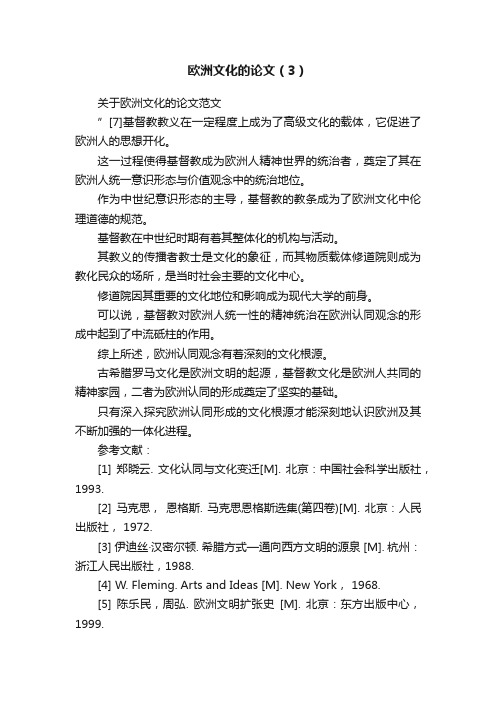
欧洲文化的论文(3)关于欧洲文化的论文范文”[7]基督教教义在一定程度上成为了高级文化的载体,它促进了欧洲人的思想开化。
这一过程使得基督教成为欧洲人精神世界的统治者,奠定了其在欧洲人统一意识形态与价值观念中的统治地位。
作为中世纪意识形态的主导,基督教的教条成为了欧洲文化中伦理道德的规范。
基督教在中世纪时期有着其整体化的机构与活动。
其教义的传播者教士是文化的象征,而其物质载体修道院则成为教化民众的场所,是当时社会主要的文化中心。
修道院因其重要的文化地位和影响成为现代大学的前身。
可以说,基督教对欧洲人统一性的精神统治在欧洲认同观念的形成中起到了中流砥柱的作用。
综上所述,欧洲认同观念有着深刻的文化根源。
古希腊罗马文化是欧洲文明的起源,基督教文化是欧洲人共同的精神家园,二者为欧洲认同的形成奠定了坚实的基础。
只有深入探究欧洲认同形成的文化根源才能深刻地认识欧洲及其不断加强的一体化进程。
参考文献:[1] 郑晓云. 文化认同与文化变迁[M]. 北京:中国社会科学出版社,1993.[2] 马克思,恩格斯. 马克思恩格斯选集(第四卷)[M]. 北京:人民出版社, 1972.[3] 伊迪丝·汉密尔顿. 希腊方式—通向西方文明的源泉 [M]. 杭州:浙江人民出版社,1988.[4] W. Fleming. Arts and Ideas [M]. New York, 1968.[5] 陈乐民,周弘. 欧洲文明扩张史[M]. 北京:东方出版中心,1999.[6] Anthony Pagden. The Idea of Europe [M]. Woodrow Wilson Center Press and Cambridge University Press. U.K. 2002.[7] 惠一鸣. 欧洲联盟发展史(上). 北京:中国社会科学出版社,2003年第1版.。
英美文化概论课程论文
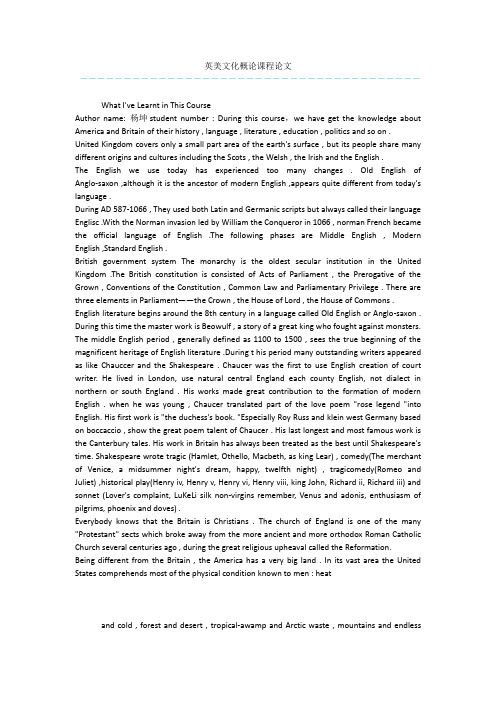
英美文化概论课程论文---------------------------------------What I've Learnt in This CourseAuthor name: 杨坤student number : During this course,we have get the knowledge about America and Britain of their history , language , literature , education , politics and so on .United Kingdom covers only a small part area of the earth's surface , but its people share many different origins and cultures including the Scots , the Welsh , the Irish and the English .The English we use today has experienced too many changes . Old English of Anglo-saxon ,although it is the ancestor of modern English ,appears quite different from today's language .During AD 587-1066 , They used both Latin and Germanic scripts but always called their language Englisc .With the Norman invasion led by William the Conqueror in 1066 , norman French became the official language of English .The following phases are Middle English , Modern English ,Standard English .British government system The monarchy is the oldest secular institution in the United Kingdom .The British constitution is consisted of Acts of Parliament , the Prerogative of the Grown , Conventions of the Constitution , Common Law and Parliamentary Privilege . There are three elements in Parliament——the Crown , the House of Lord , the House of Commons . English literature begins around the 8th century in a language called Old English or Anglo-saxon . During this time the master work is Beowulf , a story of a great king who fought against monsters. The middle English period , generally defined as 1100 to 1500 , sees the true beginning of the magnificent heritage of English literature .During t his period many outstanding writers appeared as like Chauccer and the Shakespeare . Chaucer was the first to use English creation of court writer. He lived in London, use natural central England each county English, not dialect in northern or south England . His works made great contribution to the formation of modern English . when he was young , Chaucer translated part of the love poem "rose legend "into English. His first work is "the duchess's book. "Especially Roy Russ and klein west Germany based on boccaccio , show the great poem talent of Chaucer . His last longest and most famous work is the Canterbury tales. His work in Britain has always been treated as the best until Shakespeare's time. Shakespeare wrote tragic (Hamlet, Othello, Macbeth, as king Lear) , comedy(The merchant of Venice, a midsummer night's dream, happy, twelfth night) , tragicomedy(Romeo and Juliet) ,historical play(Henry iv, Henry v, Henry vi, Henry viii, king John, Richard ii, Richard iii) and sonnet (Lover's complaint, LuKeLi silk non-virgins remember, Venus and adonis, enthusiasm of pilgrims, phoenix and doves) .Everybody knows that the Britain is Christians . The church of England is one of the many "Protestant" sects which broke away from the more ancient and more orthodox Roman Catholic Church several centuries ago , during the great religious upheaval called the Reformation.Being different from the Britain , the America has a very big land . In its vast area the United States comprehends most of the physical condition known to men : heatand cold , forest and desert , tropical-awamp and Arctic waste , mountains and endlessplain , empty apace and megalopolis , and the world's largest river system .Around the year 1000 , a party of Icelandic Vikings under Leif Ericson sailed to the eastern coast of North America . 500 years later , the need for increased trade and anerror in navigation led to another European encounter with America .Since 1607 , England began build the permanent colonies, in 150 years, after a lot of settlers poured in, settled in coastal regions, including many from Britain, it is partly from France, Germany, the Netherlands and Ireland and other countries. Middle of the 18th century, 13 British colonies had formed. Because of the climate and geographical environment, the 13 colonial area formed the different economic , political system and ideas . On April 19 ,1775 , revolution erupted .In 1782 30 November, Britain and America sign the Paris peace treaty, 1783 September 3rd, Britain formally recognized American independence .Each American is subjected to two governments , that of his state and that of the Union , and each has its own distinct function . In America each state made a constitution of its own and in its own way .That is very different from us . Every state constitution divided political power among three element .Each state entrusted the executive power to a governor . Finally , Each state had a system of courts ,and the judges in the courts were not to be subject to the executive or the legislative authorities .From the beginning of American history to the present today , American literature has recorded the story of quest . At different times the quest taken the different forms . In the 16th century Europeans came to this new world in search of the lost constinent of Atlantis.They came looking for golden " cities of Cibola " that haunted Coronado's imagination . They searched for the fabled northwest Passage to the Orient . Cooper , Poe , Emerson , Melvile , Mark Twain and Henry James were very outstanding in the history of American literature .Most of American belief in Christian and Catholic. America is a multi-ethnic, many religious country. Christian and Catholic, orthodox Judaism, Islam, Buddhism, Taoism and other religious also have many followers. Religious belief in the citizens of the population accounted for about 91%.America has many idiomatical festival as like the thanksgiving and Christmas . The thanksgiving day is on the 4th Thursday in November . On this day , Americans give thanks for the blessings they have enjoyed during the year and celebrate with dinners and happy reunions. Christmas season is the most festive time of the year in the United States. Students from grammar school through college have to two weeks' vocation .Many families go away for the holidays ,perhaps to ski in Colorado or to swim and sunbathe in Florida . People also decorate their house with christmas tree and red stars and color lights .They sing Christmas Carols,and sending Christmas cards .When I have learned this course ,I know that there is some reason for the rapid development of the Britain and the United States . The answers maybe are the democratic politics and good education . So ,if our we want our nation to be strong ,we have to built our politics and education .感谢阅读,欢迎大家下载使用!。
欧洲文化概况论文参考范文

欧洲文化概况论文参考范文在经济全球化的今天,来自各种文化的人群在各个领域的接触日益频繁,欧洲的一些国家也都在纷纷重视文化的作用。
下文是店铺为大家整理的关于欧洲文化概况论文的内容,欢迎大家阅读参考!欧洲文化概况论文篇1试谈欧洲文化线路发展概述摘要:“欧洲文化线路”由欧洲委员会于1984年提出并于1987年正式施行,其目标为“以文化合作的形式提升对欧洲一体化和文化多元化的认同,保护欧洲文化的多样性,鼓励文化间的交流,协助调解地区矛盾”。
经过四十余年理论研究与实践,“欧洲文化线路”计划在文化线路的管理体系、标准设立、资金筹措以及与其他国际组织相关项目合作等方面形成了一套完整成熟的体系。
体系、主题、形式的多元化构成了欧洲文化线路最大特点。
“欧洲文化线路”以推动新兴旅游业(如文化游、体验游等)促进当地发展,对欧洲地区的遗产保护和地区发展具有深远意义。
关键词:文化线路;欧洲委员会;多元化欧洲,作为文化线路概念的发源地,在欧洲委员会的指导下历经三十年的磨合形成了一个顺应时代背景、凝聚欧洲认同感、推动区域经济可持续发展的文化线路体系,成为提升欧洲遗产共享意识、维系民众关系、促进社会、经济、文化发展必不可少的工具。
该体系为其他国家和国际组织文化线路体系的发展奠定了理论和实践基础,对我国正在进行的文化线路和相关线性文化遗产的研究和实践工作具有参考价值。
一、概况(一)发展背景欧洲的“文化线路”(Cultural Routes)起源于欧洲委员会的“欧洲委员会文化线路”(Cultural Routesof the Council of Eur ope,以下简称“欧洲文化线路”)计划。
欧洲委员会是欧洲历史最悠久成员国最多的国际组织,其宗旨是“通过实现成员间相互团结,以维护其被视为共同遗产与促进经济和社会进步的理想和准则”。
多年来,欧洲委员会同欧盟不断致力于开展区域间文化遗产的修复与保护,并通过能力建设、文化交流等方式维护区域稳定,如保护战后科索沃地区文化多样性、格鲁吉亚战后恢复、基辅区域保护计划等。
英美文化概论期末英文论文1
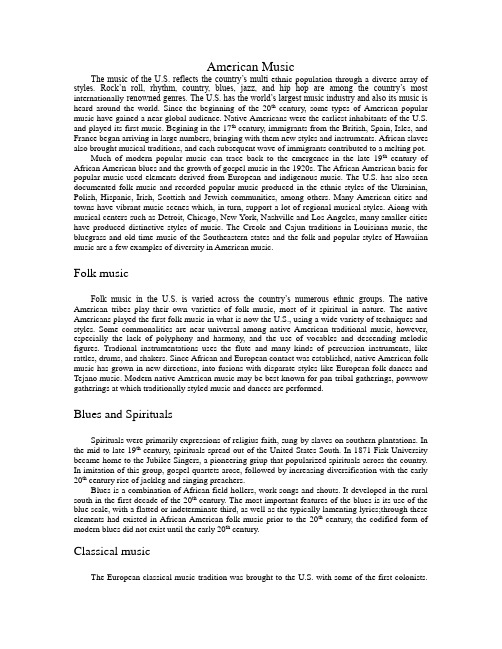
American MusicThe music of the U.S. reflects the country’s multi-ethnic population through a diverse array of styles. Rock’n roll, rhythm, country, blues, jazz, and hip hop are among the country’s most internationally-renowned genres. The U.S. has the world’s largest music industry and also its music is heard around the world. Since the beginning of the 20th century, some types of American popular music have gained a near global audience. Native Americans were the earliest inhabitants of the U.S. and played its first music. Begining in the 17th century, immigrants from the British, Spain, Isles, and France began arriving in large numbers, bringing with them new styles and instruments. African slaves also brought musical traditions, and each subsequent wave of immigrants contributed to a melting pot.Much of modern popular music can trace back to the emergence in the late 19th century of African American blues and the growth of gospel music in the 1920s. The African American basis for popular music used elements derived from European and indigenous music. The U.S. has also seen documented folk music and recorded popular music produced in the ethnic styles of the Ukrainian, Polish, Hispanic, Irish, Scottish and Jewish communities, among others. Many American cities and towns have vibrant music scenes which, in turn, support a lot of regional musical styles. Aiong with musical centers such as Detroit, Chicago, New Y ork, Nashville and Los Angeles, many smaller cities have produced distinctive styles of music. The Creole and Cajun traditions in Louisiana music, the bluegrass and old time music of the Southeastern states and the folk and popular styles of Hawaiian music are a few examples of diversity in American music.Folk musicFolk music in the U.S. is varied across the country’s numerous ethnic groups. The native American tribes play their own varieties of folk music, most of it spiritual in nature. The native Americans played the first folk music in what is now the U.S., using a wide variety of techniques and styles. Some commonalities are near universal among native American traditional music, however, especially the lack of polyphony and harmony, and the use of vocables and descending melodic figures. Tradional instrumentations uses the flute and many kinds of percussion instruments, like rattles, drums, and shakers. Since African and European contact was established, native American folk music has grown in new directions, into fusions with disparate styles like European folk dances and Tejano music. Modern native American music may be best known for pan-tribal gatherings, powwow gatherings at which traditionally styled music and dances are performed.Blues and SpiritualsSpirituals were primarily expressions of religius faith, sung by slaves on southern plantations. In the mid to late 19th century, spirituals spread out of the United States South. In 1871 Fisk University became home to the Jubilee Singers, a pioneering griup that popularized spirituals across the country. In imitation of this group, gospel quartets arose, followed by increasing diversification with the early 20th century rise of jackleg and singing preachers.Blues is a combination of African field hollers, work songs and shouts. It developed in the rural south in the first decade of the 20th century. The most important features of the blues is its use of the blue scale, with a flatted or indeterminate third, as well as the typically lamenting lyrics;through these elements had existed in African American folk music prior to the 20th century, the codified form of modern blues did not exist until the early 20th century.Classical musicThe European classical music tradition was brought to the U.S. with some of the first colonists.European classical music is rooted in the traditions of European art, concert and ecclesiastical music. The central norms of this tradition developed between 1550 and 1825, centering on what was known as the common practice period. Many American classical composers tried to work entirely within European models until late in 19th century. When Antonin Dvooak, a prominent Czech composer, visited the U.S. from 1892 to 1895, he iterated the idea that American classical music needed its own models instead of imitating European composers. He also helped to inspire subsequent composers to make a distinctly American style. By the beginning of 20th century, many American composers were incorporating disparate elements into their work, ranging from blues and jazz to native American music.Popular musicThe U.S. has produced many popular composers and musicians in the modern world. Beginning with the birth of recorded music. American performers have continued to lead the field of popular music, which out of “all the contributions made by Americans to world culture...has been taken to center by the whole world”. Most histories of popular music start with American Tin Pan Alley or ragtime. Other, however, trace popular music back to the European Renaissance and through ballads and other popular tradions. Other authors typically look at popular sheet music, tracing U.S. popular music to minstrel, spirituals shows and vaudeville, or the patriotic songs of the Civil War.JazzJazz is a tpye of music characterized by swung and blue notes, call and response vocals, improvisation and polyrhythms. Though originally a kind of dance music, jazz has been a major part of popular music, and has also become a major element of Western classical music. Jazz has roots in West African musical and classical expression, and in African music traditions including ragtime and blues, as well as European military band music. Early jazz was closely related to ragtime, with which it could be distinguished by the use of more intricate rhythmic improvisation. The earliest jazz bands adopted many vocabularies of the blues,including bent and blue notes, instrumental “growls” and smears otherwise not used on European instruments. Jazz’ro ots come from the city of New Orleans,Louisiana,populated by black Creoles and Cajuns, who combined the French-Canadian culture of the Cajuns with their own styles of music in the 19th century. Large Creole bands that played for funerals and parades became a major basis for early jazz, which spread from Chicago to New Orleans and other northern urban centers.Country musicCountry music is a combination of popular musical forms originally found in the southern U.S. and the Appalachian Mountians. It has roots in traditional folk music, blues, gospel music, Celtic music, hokum, and old-time music and evolved rapidly in the 1920s. The term country music began to be used in the 1940s when the early term hillbilly music was deeded to be degrading, and the term was widely embraced in the 1970s, while western and country have declined in use since that time, except in the U.K., where it is still commonly used.While album sales of most musical genres have declined, country music expericed one of its best years in 2006, when, during the first six months of the year, United States sales of country albums increased by 17.7% to 36 million. Furthermore, country music listening nationwide has remained steady for almost a decade, reaching 77.3 million adults every week.The term “country music” is used to describe many genres, styles, or subgenres and so on.。
关于欧洲文化论文

关于欧洲文化论文推荐文章关于欧洲文化的论文热度:医院试用期工作总结以及计划热度:社团文化节领导讲话稿范文热度:2017年校园文化建设工作计划范文热度:欧洲歌唱大赛2017歌单热度:文化存在着多层次性,有全人类的文化,也有各个民族的文化、各个社会的文化,在同一个民族、同一个社会中也会因为地域的不同、信仰的不同,产生出天线不同民族、不同社会、不同地域的文化。
那么关于欧洲的文化是怎么样的呢?下文是店铺为大家整理的关于欧洲文化论文的范文,欢迎大家阅读参考!关于欧洲文化论文篇1古希腊神话——欧洲文化的摇篮古希腊神话大约诞生于公元前8世纪,传承至今,在历史的长河中魅力无穷。
古希腊神话详细描绘了希腊人民自古心中的诸神、自然和宇宙的神话。
它的流传主要是靠古希腊人民长期口头相传下来的。
后来主要通过Homa's epic《荷马史诗》及古希腊的诗集、戏剧、哲学著作记载,传承下来。
古希腊神话包括了希腊神话中最重要的诸神开天辟地、神普关系等方面的故事,是有关希腊神话的早期资料。
古希腊神话不仅滋养了希腊本国的文化发展,而且在后世给予西方文化发展以不可磨灭的推动作用和奠基作用。
一、古代欧洲文艺发展的源泉古希腊神话是古代欧洲文学艺术兴起的源泉和土壤。
世界著名的古希腊三大悲剧诗人埃斯库罗斯、索福克里斯和欧利皮德思流传下来的三十四部悲剧中有三十三部是以神话为题材的。
现在人们可以在古希腊历史学家希罗多德的著作《历史》中收索到大量的原始的古希腊神话。
同时,古希腊神话为后期的罗马文学带来了无穷的素材资源和创作想象力。
比如说,在古罗马神话中,诸神的形象与古希腊神话相同,取名不同。
如爱神的希腊名字是Venus,罗马名字是Aphrodite;希腊神话中战神叫Ares,罗马名字则是Mars。
在古希腊奴隶制社会时期,古代欧洲的戏剧和文艺理论各方面都取得了巨大的成就。
其中最具代表性的是著名的古希腊文学家、哲学家柏拉图(Plato)和亚里士多德(Aristotle)。
《欧美文化与风情》论文(精选五篇)

《欧美文化与风情》论文(精选五篇)第一篇:《欧美文化与风情》论文本课程考查方式要求:同学们在老师所列题目中任选一题写作学科论文,(题目也可以自拟)字数要达到3000字以上,以此作为课程考察成绩。
注意事项:(1)统一使用学校的作业纸。
(2)最后一次上课时上交论文,过期不再收取作业。
1.英国的社会发展2.英国的文化与生活3.英国的礼仪习俗4.英国观光与旅游5.法国的服饰6.法国的社会发展7.法国的文化与生活8.食在法国9.法国人的生活习俗10.浪漫情怀看法国15.美国政府16.美国的“驴象之争”17.美国的礼貌习俗18.美国的高等教育19.美国大学生的生活20.美国法治一瞥21.美国社会掠影22.加拿大的文化教育22.加拿大的衣食住行23.加拿大的社会福利制度24.走遍加拿大作业题目第二篇:欧美婚礼文化论文11级人力一班魏本栋欧美婚礼文化论文婚礼,一个浪漫而温馨的名词,它是情侣步入婚姻的大门,也是夫妻关系确立的标志,婚礼是一个开始,从此夫妻之间要相互鼓励、相互搀扶,相守一生,因而,各种美好的祝愿也都在这样一个与众不同的日子变得更加有意义、更加的珍贵。
当然,随着祝福而来的就是各种各样的婚俗,人们愿意将每一种仪式都赋予它特殊的意义,充满了浪漫和美好的气息,由于中西方文化的不同,这些婚礼中的仪式和习俗在时间的累积中也渐渐有了差异,虽然随着经济和交流的全球化,许多的中西方的婚俗进行了混合,但是中西方的婚俗始终有不可替代的差异。
对于我们中国人来说,结婚是一件大喜事,既是喜事当然要办的热热闹闹、喜气洋洋,这也是我们自古以来的传统。
中国人喜欢热闹的气氛,因而婚礼的地点当然也要是能闹起来的地方。
在古代,人们会选在开阔的场院里,大家围坐桌前,爽朗的笑声,锣鼓喧天,鞭炮齐鸣,一派祥和与红火。
在当代难以寻得过去的场院,交通方便的大型酒店自然成了首选,与以往一样,从招待到入席,所有的人,无论是主人还是客人,脸上都洋溢着幸福的微笑,席间的欢歌笑语都体现了热闹这一传统。
欧洲文化导论论文
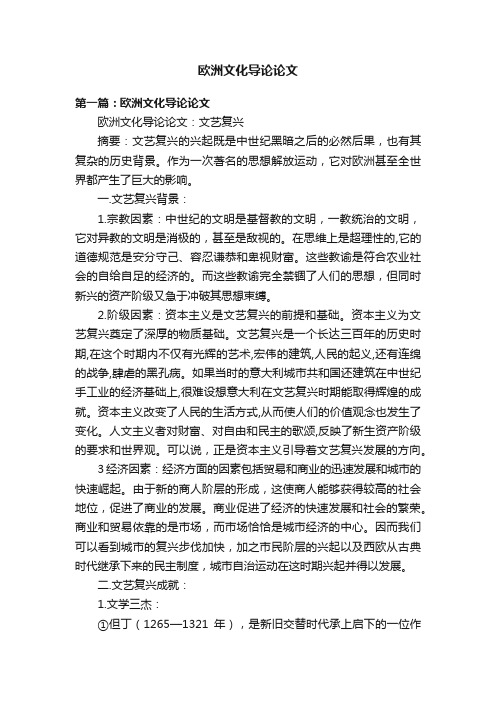
欧洲文化导论论文第一篇:欧洲文化导论论文欧洲文化导论论文:文艺复兴摘要:文艺复兴的兴起既是中世纪黑暗之后的必然后果,也有其复杂的历史背景。
作为一次著名的思想解放运动,它对欧洲甚至全世界都产生了巨大的影响。
一.文艺复兴背景:1.宗教因素:中世纪的文明是基督教的文明,一教统治的文明,它对异教的文明是消极的,甚至是敌视的。
在思维上是超理性的,它的道德规范是安分守己、容忍谦恭和卑视财富。
这些教谕是符合农业社会的自给自足的经济的。
而这些教谕完全禁锢了人们的思想,但同时新兴的资产阶级又急于冲破其思想束缚。
2.阶级因素:资本主义是文艺复兴的前提和基础。
资本主义为文艺复兴奠定了深厚的物质基础。
文艺复兴是一个长达三百年的历史时期,在这个时期内不仅有光辉的艺术,宏伟的建筑,人民的起义,还有连绵的战争,肆虐的黑孔病。
如果当时的意大利城市共和国还建筑在中世纪手工业的经济基础上,很难设想意大利在文艺复兴时期能取得辉煌的成就。
资本主义改变了人民的生活方式,从而使人们的价值观念也发生了变化。
人文主义者对财富、对自由和民主的歌颂,反映了新生资产阶级的要求和世界观。
可以说,正是资本主义引导着文艺复兴发展的方向。
3经济因素:经济方面的因素包括贸易和商业的迅速发展和城市的快速崛起。
由于新的商人阶层的形成,这使商人能够获得较高的社会地位,促进了商业的发展。
商业促进了经济的快速发展和社会的繁荣。
商业和贸易依靠的是市场,而市场恰恰是城市经济的中心。
因而我们可以看到城市的复兴步伐加快,加之市民阶层的兴起以及西欧从古典时代继承下来的民主制度,城市自治运动在这时期兴起并得以发展。
二.文艺复兴成就:1.文学三杰:①但丁(1265—1321年),是新旧交替时代承上启下的一位作家,马克思、恩格斯称他为“中世纪的最后一位诗人,同时又是新时代的最初一位诗人。
”其代表作《神曲》主要描写作者在梦中由罗马诗人维吉尔和他的恋人碧雅特丽丝引导他遍游地狱、炼狱、天堂三界的故事。
欧洲文化概论 选修课论文
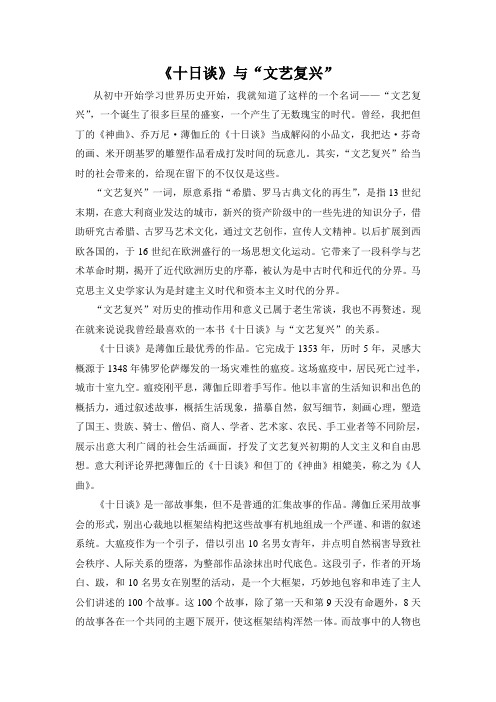
《十日谈》与“文艺复兴”从初中开始学习世界历史开始,我就知道了这样的一个名词——“文艺复兴”,一个诞生了很多巨星的盛宴,一个产生了无数瑰宝的时代。
曾经,我把但丁的《神曲》、乔万尼·薄伽丘的《十日谈》当成解闷的小品文,我把达·芬奇的画、米开朗基罗的雕塑作品看成打发时间的玩意儿。
其实,“文艺复兴”给当时的社会带来的,给现在留下的不仅仅是这些。
“文艺复兴”一词,原意系指“希腊、罗马古典文化的再生”,是指13世纪末期,在意大利商业发达的城市,新兴的资产阶级中的一些先进的知识分子,借助研究古希腊、古罗马艺术文化,通过文艺创作,宣传人文精神。
以后扩展到西欧各国的,于16世纪在欧洲盛行的一场思想文化运动。
它带来了一段科学与艺术革命时期,揭开了近代欧洲历史的序幕,被认为是中古时代和近代的分界。
马克思主义史学家认为是封建主义时代和资本主义时代的分界。
“文艺复兴”对历史的推动作用和意义已属于老生常谈,我也不再赘述。
现在就来说说我曾经最喜欢的一本书《十日谈》与“文艺复兴”的关系。
《十日谈》是薄伽丘最优秀的作品。
它完成于1353年,历时5年,灵感大概源于1348年佛罗伦萨爆发的一场灾难性的瘟疫。
这场瘟疫中,居民死亡过半,城市十室九空。
瘟疫刚平息,薄伽丘即着手写作。
他以丰富的生活知识和出色的概括力,通过叙述故事,概括生活现象,描摹自然,叙写细节,刻画心理,塑造了国王、贵族、骑士、僧侣、商人、学者、艺术家、农民、手工业者等不同阶层,展示出意大利广阔的社会生活画面,抒发了文艺复兴初期的人文主义和自由思想。
意大利评论界把薄伽丘的《十日谈》和但丁的《神曲》相媲美,称之为《人曲》。
《十日谈》是一部故事集,但不是普通的汇集故事的作品。
薄伽丘采用故事会的形式,别出心裁地以框架结构把这些故事有机地组成一个严谨、和谐的叙述系统。
大瘟疫作为一个引子,借以引出10名男女青年,并点明自然祸害导致社会秩序、人际关系的堕落,为整部作品涂抹出时代底色。
西方文化概论结业论文 英文版

My opinion about the western cultureThe western culture comes from the ancient Greek culture and the ancient Hebrew culture, it has a significant influence on the Western people’s daily life. In my opinion, the western culture can be divided into two parts, the first part is the intersection of the ancient Greek civilization and civilization of ancient Rome , the second part is the religious system and the development of the feudal rule .For the first part, the ancient Greek civilization is the first one to establish the system of Western mythology, and the ancient Rome civilization which continued to put religious and feudal rule together, in this terms ,Bronze and painting have achieved a great success, now, we can see the prosperity of ancient Greek society from the Homa's epic , we can also saw the ancient Romans’ brave and battlewise from the dilapidated Colosseum.For the second part, the Western religious system mainly focus on Christianity and Islam, the two religious system have an irreconcilable conflict ,meanwhile , they developed by recruited more and more believers, many famous war was happended in this terms, the famous one is the Crusade, in the last, the Christianity are mainly distributed in the Western Europe, however the Islam mainly distributed in Eastern Europe, which is today in the Middle East, the religious also promoted the development of architecture, form the unique characteristics of the Gothic style of building and the Baroque architecture, The climax of the Western cultural is the rise of the renaissance.It has an important influence on the development of the Modern European Civilization .In general, the western culture is the development of a comprehensive cultural. Itconsisted of Myth,war,religious and heros.Especially for Christian,nowadays,we can see that almost every Europeans is the believer of the Christian.。
英美文化概论论文
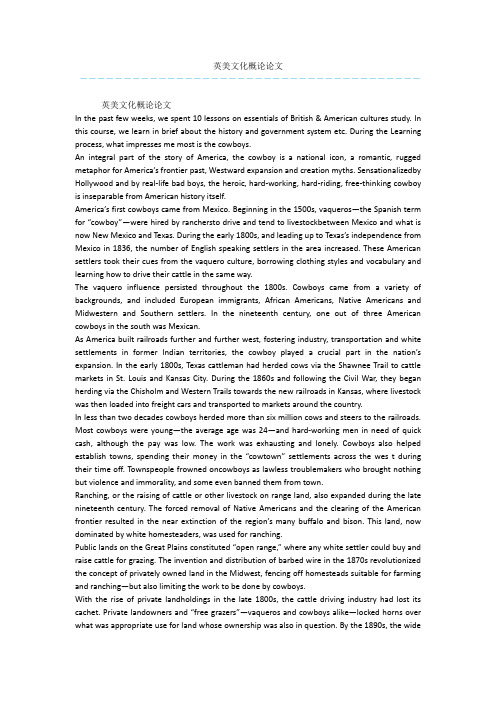
英美文化概论论文---------------------------------------英美文化概论论文In the past few weeks, we spent 10 lessons on essentials of British & American cultures study. In this course, we learn in brief about the history and government system etc. During the Learning process, what impresses me most is the cowboys.An integral part of the story of America, the cowboy is a national icon, a romantic, rugged metaphor for America’s frontier past, Westward expansion and creation myths. Sensationalizedby Hollywood and by real-life bad boys, the heroic, hard-working, hard-riding, free-thinking cowboy is inseparable from American history itself.America’s first cowboys came from Mexico. Beginning in the 1500s, vaqueros—the Spanish term for “cowboy”—were hired by ranchersto drive and tend to livestockbetween Mexico and what is now New Mexico and Texas. During the early 1800s, and leading up to Texas’s independence from Mexico in 1836, the number of English speaking settlers in the area increased. These American settlers took their cues from the vaquero culture, borrowing clothing styles and vocabulary and learning how to drive their cattle in the same way.The vaquero influence persisted throughout the 1800s. Cowboys came from a variety of backgrounds, and included European immigrants, African Americans, Native Americans and Midwestern and Southern settlers. In the nineteenth century, one out of three American cowboys in the south was Mexican.As America built railroads further and further west, fostering industry, transportation and white settlements in former Indian territories, the cowboy played a crucial part in the nation’s expansion. In the early 1800s, Texas cattleman had herded cows via the Shawnee Trail to cattle markets in St. Louis and Kansas City. During the 1860s and following the Civil War, they began herding via the Chisholm and Western Trails towards the new railroads in Kansas, where livestock was then loaded into freight cars and transported to markets around the country.In less than two decades cowboys herded more than six million cows and steers to the railroads. Most cowboys were young—the average age was 24—and hard-working men in need of quick cash, although the pay was low. The work was exhausting and lonely. Cowboys also helped establish towns, spending their money in the “cowtown” settlements across the wes t during their time off. Townspeople frowned oncowboys as lawless troublemakers who brought nothing but violence and immorality, and some even banned them from town.Ranching, or the raising of cattle or other livestock on range land, also expanded during the late nineteenth century. The forced removal of Native Americans and the clearing of the American frontier resulted in the near extinction of the region’s many buffalo and bison. This land, now dominated by white homesteaders, was used for ranching.Public lands on the Great Plains constituted “open range,” where any white settler could buy and raise cattle for grazing. The invention and distribution of barbed wire in the 1870s revolutionized the concept of privately owned land in the Midwest, fencing off homesteads suitable for farming and ranching—but also limiting the work to be done by cowboys.With the rise of private landholdings in the late 1800s, the cattle driving industry had lost its cachet. Private landowners and “free grazers”—vaqueros and cowboys alike—locked horns over what was appropriate use for land whose ownership was also in question. By the 1890s, the wideopen ranges and cattle trails were gone and privatized, and the days of the long cattle drives tothe railroads were over.Smaller-scale cattle drives continued until the mid-1900s, with livestock herded from Arizona to New Mexico and throughout the southwestern United States. Most cowboys left the open trail and took jobs at one of the myriad of private ranches that were settling across the West. But as the work of actual cowboys declined in the U.S., the cowboy lifestyle continued to be popularized—and stereotyped—by a new Hollywood film genre: the Western movie.The late 1900s were tough times for cowboys, ranchers, farmers and anyone working with the land in the U.S. Changing modes of food distribution and production, widespread urbanization and severe economic difficulties forced many to sell their land, go bankrupt, change professions, or take out large loans. As Vern Sager says in The Last Cowboy, “Don’t seem quite fair. A person works hard to make a little and gives it to the bank.”Cowboys in the 21st century might seem like an anachronism, but as Sager demonstrates, their work still needs to be done. According to the U.S. Bureau of Labor Statistics, cowboys—included in the occupation category “support activities for animal production”—numbered 9,730 workers in 2003, making an average of $19,340 per year, working in ranches, stockyards and rodeos. About one-third of these worke rs were listed in the subcategory of “spectator sports,” making their living primarily at rodeos, circuses and theatrical venues as livestock handlers.As the ranchers and cowboys of Sager’s generation age, who will be left to do their jobs? Despite decade s of socioeconomic change, cowboys still don’t have health insurance—and they don’t retire. Times might be changing, but as a symbol of persistence, self-sufficiency and a hard work ethic, cowboys live on.感谢阅读,欢迎大家下载使用!。
欧洲文化论文 The Sources of European Civilization
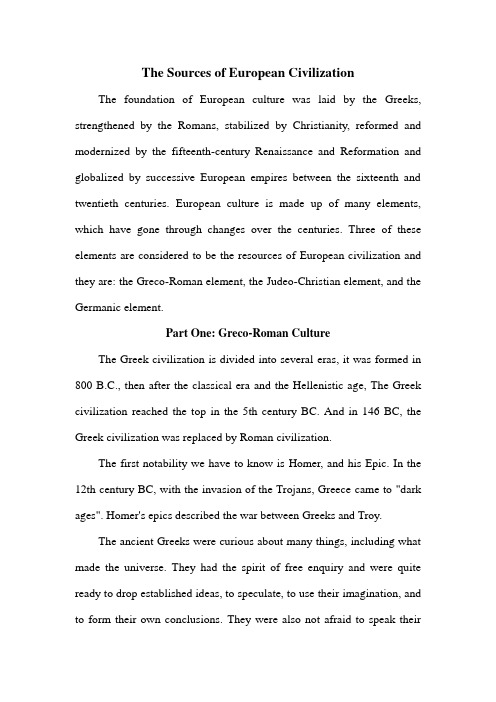
The Sources of European CivilizationThe foundation of European culture was laid by the Greeks, strengthened by the Romans, stabilized by Christianity, reformed and modernized by the fifteenth-century Renaissance and Reformation and globalized by successive European empires between the sixteenth and twentieth centuries. European culture is made up of many elements, which have gone through changes over the centuries. Three of these elements are considered to be the resources of European civilization and they are: the Greco-Roman element, the Judeo-Christian element, and the Germanic element.Part One: Greco-Roman CultureThe Greek civilization is divided into several eras, it was formed in 800 B.C., then after the classical era and the Hellenistic age, The Greek civilization reached the top in the 5th century BC. And in 146 BC, the Greek civilization was replaced by Roman civilization.The first notability we have to know is Homer, and his Epic. In the 12th century BC, with the invasion of the Trojans, Greece came to "dark ages". Homer's epics described the war between Greeks and Troy.The ancient Greeks were curious about many things, including what made the universe. They had the spirit of free enquiry and were quite ready to drop established ideas, to speculate, to use their imagination, and to form their own conclusions. They were also not afraid to speak theirminds. And also, due to the plays the Greeks performed at religious festivals early in their remote past, a powerful drama developed in the 5th century B.C.. The ancient Greece had created many philosophers and playwrights. Mainly represented by philosopher Socrates, Plato and Aristotle. Socrates pulled the importance of the free debate forward. Plato's goal was to achieve a society which can both maintains noble, and be accepted by the poor. Aristotle sought for the order for every aspect of nature and human social. The famous playwrights were Aeschylus with his Agamemnon, Sophocles with his Oedipus the King, and Euripides with his Trojan Women.Also, historical writing started early in Greece. Here we have Herodotus, who is often called “Father of History”, wrote about the war between Greeks and Persians, and Thucydides.The Greeks set an example by the bold effort they made to understand the world by the use of human reason. The body of ideas the Greek philosophers expressed, and the variety of questions the raised about the nature of the world and of human thought, knowledge and conduct, have had an abiding interest for later generations. In literature, too, they have exerted an influence which can still be felt today. Countless writers have quoted, adapted, borrowed from and otherwise use Homer’s epics, Sappho’s lyrics, the tragedies of Aeschylus and Sophocles and Euripides, Aristophanes’s comedies, Plato’s Dialogues, etc. so thattheir themes, characters, episodes, their particularly striking passages, phrases, even single words and their derivative are familiar to educated people the world over, a cherished legacy from that splendid period of human history.Then let’s come to Roman Culture. The most important contribution the Romans made to European culture was the foundation of Roman Law. Also, in architecture and art Romans made outstanding contributions, like the Colosseum and the Pantheon.Part Two: Judeo-Christian CultureAmong all the religions by which people seek to worship, Christianity is by far the most influential in the West. Every phase of man’s life is touched by this religion, so much so that it has become part and parcel of Western culture. Judaism and Christianity are closely related. In fact, it was the Jewish tradition which gave birth to Christianity. Both originated in Palestine—the hub of migration and trade routes, which led to exchange of ideas over wide areas.The Old Testament recorded the history of the Jews. Jews were once called Hebrews,strayed in Middle East Desert in about 3800 BC. In about 1300 BC, they gradually settled down in Canaan, and formed a small kingdom.Christianity and Judaism have close relationship. The core of the Christian is Jesus Christ, its doctrine is: one, Jesus Christ is the son ofgod, god sent him to men, suffer torments with humans and eventually save mankind. Second, the Christ is the only son of god , anyone who believe in Christ finally get eternal life.The major Christian classic is the bible. The "bible" is consist of the new testament and the old testament. The Old Testament has 39 parts writing about the things happened during 1000-B.C. to 100A.D. the most important parts including genesis, the exodus, "Levi remember", "the number of people remember", "deuteronomy". The New Testament came after the rise of Christian, with a total of 27 volumes. The first four volumes talks about the legend of Jesus' words and deeds, and the legend of the Jesus' apostles.Part Three: Germanic CultureIn the latter part of the fourth century the Huns swept into Europe from central Asia, robbing and killing as they came along, and large numbers of the half civilized Germanic tribes such as the Visigoths, the Franks, the Angles and Saxons, and the V andals fled their homelands in northern Europe and were pushed to cross the Danube river into the territory of the Roman Empire. In A.D. 476 a Germanic general killed the last Roman emperor and took control of the government. While the Eastern Roman Empire continued, the power of ancient Rome was gone. In its place mushroomed a great many Germanic kingdoms, which in a few hundred years were to grew into the nations known as England,France, Spain, Italy, and Germany. This is a period in which classical, Hebrew and Gothic heritages merged. And it is this fusion and blending of different ideas and practices that paved the way for the development of what is present-day European culture.Christianity played a very important role in Europe political life of the feudal society; it became the spiritual pillar of the feudal system. Christian world rejected alien and militant control (o ne of the most famous was the Crusades). Especially a few times to invade Palestine. Although it ended in failure, but promoted the cultural exchange between east and west, and prepared for the formation of the monarchy.In the academy and science, Charlemagne and his Carolingian Renaissance, Alfred the Great and his academic centre, St. Thomas Aquinas’ Scholasticism and Roger Bacon, all did great contribution to the preserve and development of the culture.In literary, there was a long Epic. The Anglo-Saxon's epic "the Europe of Woolf" is the most complete one spread until now, and the song of Roland is the most famous French epic. There were also great poets, Dante and Chaucer. And the famous Italian poet Dante's "divine comedy" is the landmark in the world literature history, expressing the upcoming Renaissance humanistic ideas. Geoffrey Chaucer is called the first short story writer in English literature history and the first modern poet, his most famous work is the Canterbury tales.The architecture and art is mainly the Romanesque and gothic, they are the extension of classical art.To sum up, European Civilization has inherited a lot from the Classical Civilization, including ancient Greek philosophy sense, ancient Roman laws, Latin language, and most significantly, Christianity.And those three cultures we have talked about are the main resources of European culture; they are all of vital importance in the development of European culture.。
欧洲文化概况论文
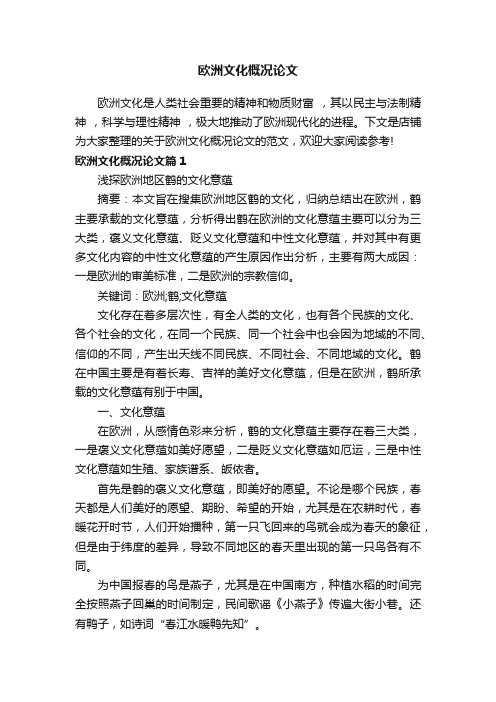
欧洲文化概况论文欧洲文化是人类社会重要的精神和物质财富,其以民主与法制精神,科学与理性精神,极大地推动了欧洲现代化的进程。
下文是店铺为大家整理的关于欧洲文化概况论文的范文,欢迎大家阅读参考!欧洲文化概况论文篇1浅探欧洲地区鹤的文化意蕴摘要:本文旨在搜集欧洲地区鹤的文化,归纳总结出在欧洲,鹤主要承载的文化意蕴,分析得出鹤在欧洲的文化意蕴主要可以分为三大类,褒义文化意蕴、贬义文化意蕴和中性文化意蕴,并对其中有更多文化内容的中性文化意蕴的产生原因作出分析,主要有两大成因:一是欧洲的审美标准,二是欧洲的宗教信仰。
关键词:欧洲;鹤;文化意蕴文化存在着多层次性,有全人类的文化,也有各个民族的文化、各个社会的文化,在同一个民族、同一个社会中也会因为地域的不同、信仰的不同,产生出天线不同民族、不同社会、不同地域的文化。
鹤在中国主要是有着长寿、吉祥的美好文化意蕴,但是在欧洲,鹤所承载的文化意蕴有别于中国。
一、文化意蕴在欧洲,从感情色彩来分析,鹤的文化意蕴主要存在着三大类,一是褒义文化意蕴如美好愿望,二是贬义文化意蕴如厄运,三是中性文化意蕴如生殖、家族谱系、皈依者。
首先是鹤的褒义文化意蕴,即美好的愿望。
不论是哪个民族,春天都是人们美好的愿望、期盼、希望的开始,尤其是在农耕时代,春暖花开时节,人们开始播种,第一只飞回来的鸟就会成为春天的象征,但是由于纬度的差异,导致不同地区的春天里出现的第一只鸟各有不同。
为中国报春的鸟是燕子,尤其是在中国南方,种植水稻的时间完全按照燕子回巢的时间制定,民间歌谣《小燕子》传遍大街小巷。
还有鸭子,如诗词“春江水暖鸭先知”。
欧洲的保加利亚地区的春天也是鸟类迁徙后回巢的时间,其中鹤扮演着核心角色:当第一只鹤出现,意味着春天真得到来了!因此在保加利亚的传说中,鹤是春天的象征。
鹤带来的春天,让人们意识到已经到了播种的季节,也是对新的一年的希望,因此鹤就责无旁贷的承载起人们对新的一年的美好愿望。
其次是鹤的贬义文化意蕴,即厄运。
关于欧洲文化的论文[欧洲文化论文]
![关于欧洲文化的论文[欧洲文化论文]](https://img.taocdn.com/s3/m/f75fa6baf021dd36a32d7375a417866fb84ac0d1.png)
关于欧洲文化的论文[欧洲文化论文]欧洲文化论文篇1浅谈欧洲高校校园文化【摘要】在不同的国度里,校园文化依据一定的地域性,形成了不同的风格。
这种地域性不仅受民族传统、风俗习惯的影响,更受国家性质的制约。
文章通过分析欧洲高校校园文化的产生的时代背景和发展历程,总结出欧洲高校校园文化的特点。
为我国为我国的校园文化建设提供批判性吸收借鉴西方校园文化的合理成分,提供有价值的思路。
【关键词】亚文化;校园文化;自由民主一、校园文化(一)文化文化作为一种社会历史现象,既是人类社会实践的产物,也是人类社会得以延续和发展的基本途径之一。
文化在发展的过程中会产生一些特有的现象,并且形成一些相应的概念,亚文化就是之一,亚文化是指文化的核心即价值观念和主流文化相一致,为社会上一部分人享有的文化,亦称小群体文化。
亚文化是整体文化的一个组成部分,但也有自己的特点。
(二)高校校园文化二、欧洲校园文化(一)欧洲校园文化的产生一方面,第二次社会大分工使手工业从农业中区分开来,一些从事专门知识研究的机构应运而生,城市市民按照自己的需求建立了一批大学,成为现代大学的雏形。
另一方面,基督教会一直是古代文化的承担者和传播者。
在教会的努力下,陆续出现了一些修道院学校、大主教区学校和教区学校,这些学校,是现代大学的前身。
欧洲校园文化就伴随着现代大学的产生而产生。
(二)欧洲校园文化的特点西方文化在大学校园的目标是:不仅为青年一代就业创造条件,而且要使他们有目的地生活,要塑造人格尽可能和谐发展的公民。
因此西方高等学校重视学生自治,发挥学生主体作用;重视课外活动、课外教育;重视情境的熏陶,潜移默化地影响学生。
1.西方校园文化历史长,发展快。
18世纪欧洲进入工业化时代为欧洲各国的教育发展打下了坚实的物质基础,促进了西方高等教育的发展。
校园成了近代以来西方社会结构中举足轻重的部分。
与此同时,校园文化应运而生,并逐步发展。
2.价值多元,。
自治的氛围和自由的学术环境让各种文化价值都有生存的空间。
英美文化论文
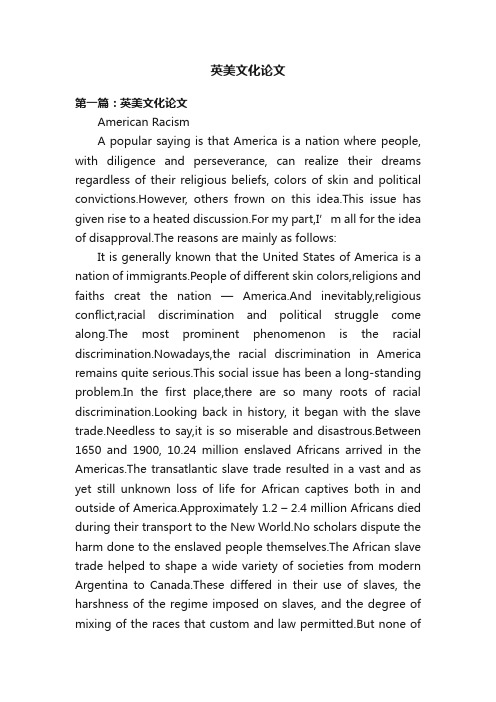
英美文化论文第一篇:英美文化论文American RacismA popular saying is that America is a nation where people, with diligence and perseverance, can realize their dreams regardless of their religious beliefs, colors of skin and political convictions.However, others frown on this idea.This issue has given rise to a heated discussion.For my part,I’m all for the idea of disapproval.The reasons are mainly as follows:It is generally known that the United States of America is a nation of immigrants.People of different skin colors,religions and faiths creat the nation —America.And inevitably,religious conflict,racial discrimination and political struggle come along.The most prominent phenomenon is the racial discrimination.Nowadays,the racial discrimination in America remains quite serious.This social issue has been a long-standing problem.In the first place,there are so many roots of racial discrimination.Looking back in history, it began with the slave trade.Needless to say,it is so miserable and disastrous.Between 1650 and 1900, 10.24 million enslaved Africans arrived in the Americas.The transatlantic slave trade resulted in a vast and as yet still unknown loss of life for African captives both in and outside of America.Approximately 1.2 – 2.4 million Africans died during their transport to the New World.No scholars dispute the harm done to the enslaved people themselves.The African slave trade helped to shape a wide variety of societies from modern Argentina to Canada.These differed in their use of slaves, the harshness of the regime imposed on slaves, and the degree of mixing of the races that custom and law permitted.But none ofthese became as virulently racist--insisting on racial separation and a strict color bar--as the English North American colonies that became the United States.The institution of slavery was abolished through Civil War,a bloody second American revolution that cost at least 600,000 lives.Today,in the United States, although legal racial discrimination was cancelled,institutionalized racism remained intact.In addition, the United States parties which are based on different interests,1 formulate a series of related policies and harmed the interests of black people.The original U.S.Constitution permitted slavery and counted Black slaves as three-fifths of white persons in determining both Congressional representation and taxation, which were deeply rooted the racism in the very foundation of U.S.society.Unfortunately,to blacks,their performance provide discrimination discourse.In the black areas, the excessive crime happen at any moment.Worse still, Black also do the drug trade which undoubtedly violates the nation’s law.Politicians from both the Democratic and Republican Parties got the big calls “tough on crime,” embracing the so-called war on drugs, which tripled the prison population between 1980 and 1995.Two-thirds of those who entered the prison system during that period were Black, Latino or poor, and the vast majority of them were nonviolent drug offenders.Today, with the prison population swollen to more than 2 million, African Americans make up just 12 percent of the U.S.population and only 13 percent of drug users, yet account for 35 percent of drug arrests and 53 percent of drug convictions.Blacks are also 43 percent of those on death st year, the U.S.Bureau of Justice Statistics estimated that 30 percent of 12 year-old Black boys will spend time in jail in their lifetimes--far more than will attend college.And because manystates have laws denying present and former inmates the right to vote, an estimated 13 percent of all Black men--including one in every three in Alabama and Florida--have been disenfranchised.In light of racial discrimination,black people conducted a series of racial fights which was called the Civil Rights Movement.The most illustrious march is probably the March on Washington for Jobs and Freedom.It is best remembered for the glorious speech Martin Luther King, Jr.gave, in which the “I have a dream” part t urned into a national text and eclipsed the troubles the organizers had to bring to march forward.The process was long and tenuous,and many of these movements did not fully achieve their goals although,the efforts of these movements did lead to improvements in the legal rights of previously oppressed groups of people.The current status of racism in America are still in poor condition.While discrimination has decreased and old forms of segregation have been recalled,subtlepatterns of informal discrimination in housing,employment,education and virtually every social sphere still persists.Indeed,for many African Americans,discrimination,as of now,remains a central part of their experience in the United States.According to a report of American, the black’s inco me only accounted for the three-fourths of the white,and African-American family’s income was just one-tenth of the white family’s.Half of all black men in New York can’t find a job,while Black teenage unemployment stands at 37 percent nationwide.As Mr.Bus h said,”And this poverty has roots in generations of segregation and discrimination that has closed many doors of opportunity“.These statistics show a crisis among Black Americans that should be setting of alarm.Racism, notcriminal records, explains the high unemployment rate for Black men today.A recent Wall Street Journal report showed that in the city of Milwaukee, a white job applicant with a criminal record has a better chance of being called for an interview than a Black man with no criminal record.”The disadvantage carried by a young Black man applying for a job as a dishwasher or a driver is equivalent to forcing a white man to carry an 18-month prison record on his back,“ concluded reporter David Wessel.And only racism can explain these statistics: Segregation in public schools, which decreased continuously from the 1950s to the late 1980s, has now returned to levels not seen in three decades.Black infants are almost two-and-a-half times more likely than white infants to die before the age of one, a wider gap than in 1970.More than 200 years since slavery was written into the U.S.constitution, its racist legacy remains--and the words of abolitionist Frederick Douglass remain true: ”Without struggle, there can be no progress."In general,only a struggle that shakes the foundation of U.S.society can end racism.As is the always the case,the darkest hour comes before the dawn.A mixed-race man is president says much about the peaceful progress on race relations in America.I believe that the black people can have equal rights and are free to live, study and work as they wish in the future,and people can truly realize their dreams regardless of their religious beliefs, colors of skin and political convictions.第二篇:英美文化(二)带来交际中的尴尬一位50来岁的美国妇女在中国任教,有一位年的中国同事请她到自己家里来吃饭,一进门,女主人就把4岁的女儿介绍给客人。
如何看待欧洲文化英语作文
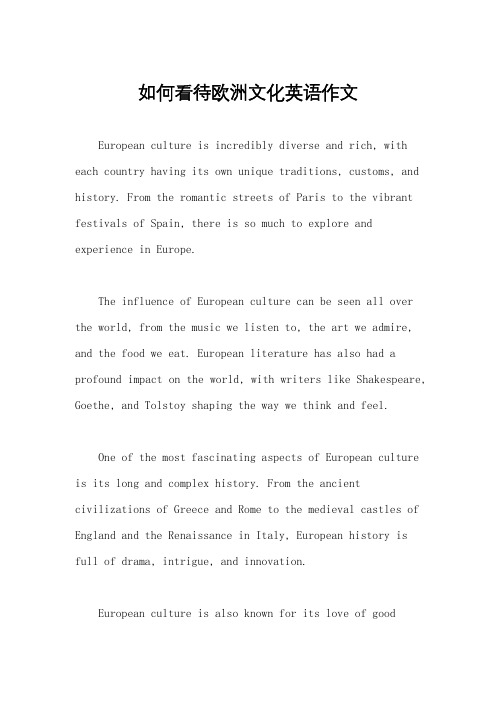
如何看待欧洲文化英语作文European culture is incredibly diverse and rich, with each country having its own unique traditions, customs, and history. From the romantic streets of Paris to the vibrant festivals of Spain, there is so much to explore and experience in Europe.The influence of European culture can be seen all over the world, from the music we listen to, the art we admire, and the food we eat. European literature has also had a profound impact on the world, with writers like Shakespeare, Goethe, and Tolstoy shaping the way we think and feel.One of the most fascinating aspects of European culture is its long and complex history. From the ancient civilizations of Greece and Rome to the medieval castles of England and the Renaissance in Italy, European history isfull of drama, intrigue, and innovation.European culture is also known for its love of goodfood and wine. Each country has its own culinary specialties, from the hearty stews of Ireland to the delicate pastries of France. And of course, no discussion of European culture would be complete without mentioning the rich tradition of cheese making.In conclusion, European culture is a vibrant tapestry of traditions, history, and creativity. It has left an indelible mark on the world and continues to inspire and captivate people from all walks of life.。
欧洲文化论文(中西文化对比)
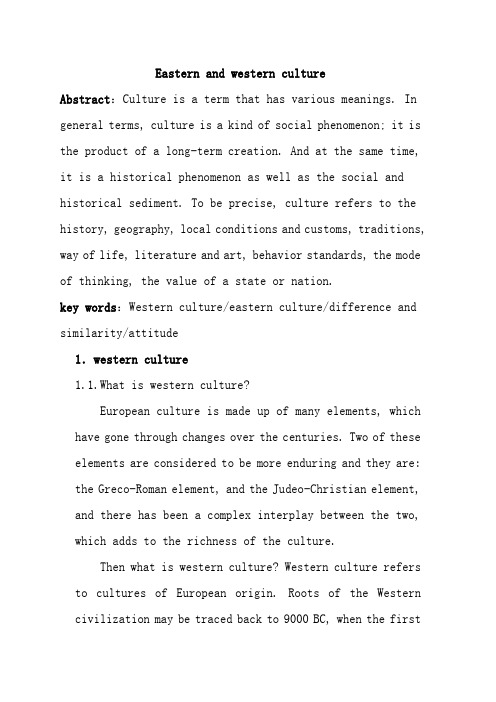
Eastern and western cultureAbstract:Culture is a term that has various meanings. In general terms, culture is a kind of social phenomenon; it is the product of a long-term creation. And at the same time, it is a historical phenomenon as well as the social and historical sediment. To be precise, culture refers to the history, geography, local conditions and customs, traditions, way of life, literature and art, behavior standards, the mode of thinking, the value of a state or nation.key words:Western culture/eastern culture/difference and similarity/attitude1.western culture1.1.What is western culture?European culture is made up of many elements, which have gone through changes over the centuries. Two of these elements are considered to be more enduring and they are: the Greco-Roman element, and the Judeo-Christian element, and there has been a complex interplay between the two, which adds to the richness of the culture.Then what is western culture?Western culture refers to cultures of European origin. Roots of the Western civilization may be traced back to 9000 BC, when the firstgreat cultures grew out of agricultural cores in South-West Asia, China, Pakistan, Mexico, and Peru. The Westernmost of this Old World's agricultural cores, the area around the headwaters of the Euphrates, Tigris, and Jordan Rivers in South-West Asia, spread outwards across Europe. Western culture in its strictly European geographical range began with the Greeks, was enlarged and strengthened by the Romans, reformed and modernized by the fifteenth-century Renaissance and Reformation, and globalize by successive European empires that spread the European ways of life and education between the sixteenth and twentieth centuries. European Culture developed with a complex range of philosophy, medieval scholasticism and mysticism, Christian and secular humanism. Rational thinking developed through a long age of change and formation with the experiments of enlightenment, naturalism, romanticism, science, democracy, and socialism. With its global connection, European culture grew with an all-inclusive urge to adopt, adapt, and ultimately influence other trends of culture.2. Eastern cultureWhen it comes to Chinese culture, we will first thinkabout Confucianism. And we will call Confucius to our mind. Now, let me give you some other examples that related to Chinese culture.2.1. Study of Chinese Folklore in ChinaThe Book of Songs, the earliest known Chinese collection of poetry, contains 160 folk songs in addition to courtly songs and hymns. It is believed that Confucius did encourage his followers to study the songs contained in the Shi Jing, helping to secure the Shi Jing’s place among the Five Classics. After Confucian ideas became further entrenched in Chinese culture, Confucius’ end orsement led many scholars to study the lyrics of the Shi Jing and interpret them as political allegories and commentaries.2.2. Numbers in Chinese cultureIn Chinese culture, certain numbers are believed by some to be auspicious (吉利) or inauspicious (不利) based on the Chinese word that the number name sounds similar to. However some Chinese people regard these beliefs to be superstitions. Since the pronunciation and the vocabulary may be different in different Chinese dialects, the rules are generally not applicable for all cases. Because of the supposed auspiciousness of certain numbers, some peoplewill often choose, attempt to obtain, or pay large sums for numbers that are considered to be lucky for their phone numbers, street addresses, residence floor, driver's license number, vehicle license plate number, bank account number, etc.Lucky numbers are based on Chinese words that sound similar to other Chinese words. The numbers 6, 8, and 9are believed to have auspicious meanings because their names sound similar to words that have positive meanings.2.3. Table mannersChinese table manners are the traditional styles that are used for eating in the region of China. In most dishes in Chinese cuisine(烹饪), food is cooked in bite-sized pieces and easy to grab and eat. Therefore, chopsticks are used at the table instead of forks and knives. Eating is a dominant aspect of the Chinese culture. In China, eating out is one of the most accepted ways to treat guests. Similar to Westerners drinking in a bar with friends, eating together in China is a way to socialize and deepen friendship.There are many traditions that govern table manners in China such as the correct treatment of guests and how touse chopsticks correctly. Although each Chinese household has its own set of table manners and rules, the foundational traditions used to welcome guests are the same.3. The difference between western culture and eastern culture.As we know, there are so many differences between east and west culture. And I can not list all of their different aspects. For your better understanding, I will focus on the differences of some common customs of China and America.3.1.It is no doubt that using chopstick is a traditional custom for Chinese people. But people in America prefer to forks and knives. This difference is based on different food they like .Americans choose to eat beefsteak, bread, and salad, while Chinese people choose noodles, pancakes and rice. What’s more, the custom of drinking tea in China and drinking coffee in America are standing out particularly.3.2.Greeting and PartingIn China, when people meet acquaintances or friends, we always say, “Have you eaten yet?” What are you going to do?” but In English, people often employ the following expressions to greet each other “Goodmorning/evening/afternoon. “Fine day, isn’t it? ” “How is everything going?” etc3.3. Compliments and ResponseFor example, if a hostess is complimented for her cooking skill, how she will response in west and china?A Chinese hostess will apologize for giving you “Nothing”. She will say“I just made some dishes casually and they are not very tasty.”But an western hostess is likely to say, “Oh, I am so glad that you liked it. I cook it especially for you.”3.4. Thanks and ResponsesIn China,“Thank you” is not frequently used between intimate friends and family members because it may imply a certain distance between the addresser and the addressee. But “Thank you” is widely used in English to show gratitude in such cases as being invited, helped, given a gift, etc. So much examples, I hope you could have a better understanding of Chinese and European culture.4. The attitude we should take toward different culture. There are so many difference between two culture background. For our Chinese, there is no denying that the European culture is worthy to be learned by us. But during thisprocess, how will we treat this civilization and use it? It’s really necessary for us to think over.Someone says that the western culture is superior. It is one of the reasons they learn about it. But on the contrary, many people strongly disagree with this, they believe our own culture is the best, and we should keep it without any change. In my opinion, in order to develop our culture, we should do like the following.4.1. remove the dross while keeping the essence.First, the advantage such as education system, we should learn from other country. But the disadvantage like our own festival, we should keep it going from generation to generation. Only by doing this can our culture developed in the right way.4.2 Borrow the foreign cultures while using our brains.In the second place, we should borrow the foreign cultures while using our brains. Have you realized that you are the sacrificial lamb instead of flaunting the individuality when you are going for the western-cultured skirt and the junk food? Today, our traditional culture which should be carried forward is destroyed seriously by the culture abroad. If one day Confucius possibly revives,don’t you feel that it is so dismal to point at the classical roofs of the skyscrapers beside the Chang’an Street and tell him, “This is our Chinese civilization”? Looking at our Chinese architecture, except the so-called classical architecture “culture heritage” es tablished by the culture protection association, most of the architectures are of “modern style”. Maybe the reason is that they are the product of imitating the style of western architecture. They have no origins as well as belongings. So we can just cal t hem “modern”. Can we say that we learn from the west well? Many parents bring their children to the KFC without minding waiting for a long time because there are so many people queuing up and waiting for there turn. This kind of improper education, which fawning on the foreign things, leads to the distruction of our cultural root which is actually insecure before. We does not imitate well, while gradually lost our tradition. The most fundamental or important things are often been ignored. We have our Confucius(the founder of our dominant culture), Zhuangzi(the most intelligent philosopher), Qin Shi Huang(the most influential statesman), Xuanzang(the most serious adoptionist and scholar)… There is no lack ofsages while people in this generation are lacking mind or ideas.Someone says that pro-human life culture is Western culture. And the extent to which a nation embraces Western culture is the extent to which it is free, prosperous, modern and peaceful. That is supportive of human life. One need only look at life expectancies around the world to see that whether this is true.The civilization of our own was delivered from generation to generation for thousands of years. But today, we can see obviously that citizens of our nation are becoming more and more fa wning on foreign things. It’s so easy to find a shirt with English words. It’s so prevailing to wear jeans. We like going into the European-styled restaurant to enjoy the western food. We say “Bye-bye” instead of “zaijian”. What’s more, our traditional festivals like the Spring Festival are desolated. We celebrate the Valentine’s Day every February instead of the Chinese Valentine’s Day according to the lunar calendar every June.参考文献:。
关于欧洲文化的论文
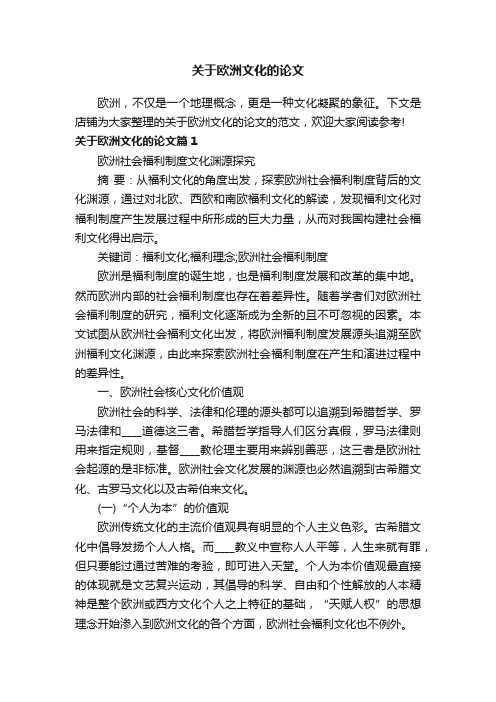
关于欧洲文化的论文欧洲,不仅是一个地理概念,更是一种文化凝聚的象征。
下文是店铺为大家整理的关于欧洲文化的论文的范文,欢迎大家阅读参考!关于欧洲文化的论文篇1欧洲社会福利制度文化渊源探究摘要:从福利文化的角度出发,探索欧洲社会福利制度背后的文化渊源,通过对北欧、西欧和南欧福利文化的解读,发现福利文化对福利制度产生发展过程中所形成的巨大力量,从而对我国构建社会福利文化得出启示。
关键词:福利文化;福利理念;欧洲社会福利制度欧洲是福利制度的诞生地,也是福利制度发展和改革的集中地。
然而欧洲内部的社会福利制度也存在着差异性。
随着学者们对欧洲社会福利制度的研究,福利文化逐渐成为全新的且不可忽视的因素。
本文试图从欧洲社会福利文化出发,将欧洲福利制度发展源头追溯至欧洲福利文化渊源,由此来探索欧洲社会福利制度在产生和演进过程中的差异性。
一、欧洲社会核心文化价值观欧洲社会的科学、法律和伦理的源头都可以追溯到希腊哲学、罗马法律和____道德这三者。
希腊哲学指导人们区分真假,罗马法律则用来指定规则,基督____教伦理主要用来辨别善恶,这三者是欧洲社会起源的是非标准。
欧洲社会文化发展的渊源也必然追溯到古希腊文化、古罗马文化以及古希伯来文化。
(一)“个人为本”的价值观欧洲传统文化的主流价值观具有明显的个人主义色彩。
古希腊文化中倡导发扬个人人格。
而____教义中宣称人人平等,人生来就有罪,但只要能过通过苦难的考验,即可进入天堂。
个人为本价值观最直接的体现就是文艺复兴运动,其倡导的科学、自由和个性解放的人本精神是整个欧洲或西方文化个人之上特征的基础,“天赋人权”的思想理念开始渗入到欧洲文化的各个方面,欧洲社会福利文化也不例外。
(二)“博爱互助”的价值观欧洲传统文化与东方传统文化最明显的不同在于,东方传统文化过于强调以血缘关系为纽带的差序之爱,欧洲则主张淡化血缘,主张普遍的博爱精神。
____主张不分远近亲疏的普遍之爱,强调对弱者的爱。
欧洲文化概况论文(2)

欧洲文化概况论文(2)欧洲文化概况论文篇3浅论欧洲浪漫主义音乐的文化特征摘要:欧洲浪漫主义音乐与古典主义音乐相比,已经具有新的文化性质。
浪漫主义音乐没有把自己尘封在历史的话语里,它与古典主义音乐之间,存在着文化内层断裂而形式外壳连接的关联,即通过对传统的断裂,从文化内层来延续着未来的音乐。
关键词:欧洲浪漫主义音乐文化一引言舒曼曾说过“浪漫主义不是形象和形式的问题,而是作曲家是不是诗人的问题。
”音乐是一种感官的表述,其形式是意识形态的载体,是内心体验的外化。
欧洲浪漫主义音乐更多地是用心灵的感悟和体验来把握世界。
当我们站在历史的高度以新的视点重新审视欧洲浪漫主义音乐时,会发现浪漫主义音乐与古典音乐相比已具有新的文化性质。
二浪漫主义音乐的理性反叛浪漫主义音乐从追求独特、不受约束的情感、反叛的理性主义开始。
但这并不意味着浪漫主义音乐背弃了理性。
理性是人的一种相对的、自由的精神,而理性主义则是一种绝对的、僵化的观念,是一种渊源于西方古希腊文化的理性传统,其间经过宗教主义的补充和近代人文精神的阐释,最终形成以片面高扬人的理性性质为特征的思想传统。
浪漫主义者反对理性主义,他们认为理性主义并不能改变现实,不过是一个美丽的谎言。
相反,浪漫主义音乐注重人的本能,他们认为世界的本质要靠直观去领悟,靠心灵去体验。
浪漫主义之前的古典主义音乐对感情的表达与浪漫主义有本质的区别,古典主义时期音乐家传达的是“我们”的情感。
而浪漫主义音乐表现的情感极富个性化,是“我”的情感。
李斯特的辉煌宏大,柏辽兹的泼辣奇异,肖邦的款款深情等,构成了浪漫主义音乐异彩纷呈的情感世界。
古典主义音乐强调的是理性对感情的支配或理性与情感的协调平衡;而浪漫主义音乐重视的则是感情对理性的统治和超越。
正如华兹华斯《抒情歌谣集》序言里所说:“诗歌是强烈感情的自然流露”,这成了浪漫主义音乐艺术对感情追求的宣言。
古典主义音乐家的创作要在理性规则不受破坏下放置自己的感情;而到了浪漫主义时期,规则必须服从感情表达的需要,浪漫主义者的共同心声是将人的感情从理性主义的束缚下解脱出来,浪漫主义作曲家为了表现内心感情的涌动,往往热衷于标新立异。
选修课欧洲文化概况论文

欧洲文化概况之发展史欧洲文化的发展,带有其自身的色彩。
从其发展演变过程来看,我们可大致将其分为五个时期:一、古典时期(the Classic Age,1200 B.C~476 A.D)欧洲“古典时期”的文化是由地处南欧的希腊人创立的,那是整个欧洲文化的发源地,他们创造了古希腊文明及古罗马文明。
主要是古希腊文明(the Ancient Greek Civilization)及古罗马文明(the Ancient Roman Civilization)。
奉行的是异教徒的信仰和实践(Paganism)。
异教徒指非基督教徒,非犹太教徒,非伊斯兰教徒。
理念上鲜有束缚,实践中享受人生,个性突出,热情奔放,创造力旺盛,风格多姿多彩。
那个年代理念上鲜有束缚,丰裕的物质条件、欢愉的精神生活和足够的闲暇时间,雅典人民或去露天广场出席公民大会,聆听别人演讲,高兴了慷慨激昂地发表自己的高见;或通宵达旦地看戏剧;或去柏拉图学院去听大师讲学;或去运动,扔铁饼;或约三五好友,在澡堂子里穿着浴袍高谈阔论直至天将破晓……在享乐主义的旗帜下求得个人才智的增长与道德品质的完美——直到今天,南欧诸国的子民,仍旧保持着那个时代的鲜明烙印。
他们说,现在南欧人习惯在早上和下午或晚上各喝一杯咖啡,而且最好是那种一小杯暗黑、浓郁、半苦半甜且带着焦味的咖啡,上层浮着热牛奶油沫、带着一点点的沉淀在杯底,喝咖啡的人以只手捧着碗或杯子,以咖啡的热度来温热他们的手掌或用鼻孔来感觉咖啡香,如果可能的话,他们甚至希望能跳入碗或杯中洗澡。
二、中世纪时期(the Middle Ages,476~1453)公元500年至1500年,被看成是人类进步征途中一个漫长而毫无目标的迂回时代——穷困、迷信、黯淡的一千年,将罗马帝国黄金时代和意大利文艺复兴新黄金时代分隔开来。
”于是,中世纪无异于“黑暗时代”的代名词。
可是,如果以相因而持续的眼光来观看这三个世代相承的历史阶段的时期更替,“史学家现在认识到中世纪欧洲具有巨大的创造力”,因为“经年累月的研究已经表明,中世纪社会仍在持续发生变化”,这就是“约在公元1500年左右,中世纪时代结束时,欧洲的技术与政治的和经济的结构,已在世界上所有其他文明当中占有决定性的优势”。
- 1、下载文档前请自行甄别文档内容的完整性,平台不提供额外的编辑、内容补充、找答案等附加服务。
- 2、"仅部分预览"的文档,不可在线预览部分如存在完整性等问题,可反馈申请退款(可完整预览的文档不适用该条件!)。
- 3、如文档侵犯您的权益,请联系客服反馈,我们会尽快为您处理(人工客服工作时间:9:00-18:30)。
对外经济贸易大学University of International Business and Economics欧美文化概论论文Comparisons between two shining stars in philosophyComparisons between two shining stars in philosophyAbstractAs we all know, philosophy is the origin of all subjects. So, telling the differences between two philosophic thinking is the key to compare different cultures. This thesis is generally about the introductions and the comparisons between the philosophy of the Greek mythology and themiddlebrow from the Confucius, two shining stars of their own culture. Firstly, the thesis will give a brief introduction about the middlebrow philosophy and its social background. Tell the readers why does the middlebrow philosophy come into being and give a detailed expression about it from Confucius’s saying. Then introduce the philosophy of the ancient Greek, its stories, and show how the philosophy come into being and develops, analyzing the embodiment of its value . At the same time, do comparisons between the philosophy of the Greek mythology and the middlebrow from the Confucius which comes from the different times, areas, and civilizations.Confucius and his philosophyAlthough Confucianism is often followed in a religious manner by the Chinese, arguments continue over whether it is a religion. Confucianism lacks an afterlife, its texts express complex and ambivalent views concerning deities, and it is relatively unconcerned with some spiritual matters often considered essential to religious thought, such as the nature of the soul.Confucius' principles gained wide acceptance primarily because of their basis in common Chinese tradition and belief. He championed strong familial loyalty, ancestor worship, respect of elders by their children (and, according to later interpreters, of husbands by their wives),and the family as a basis for an ideal government . He expressed the well-known principle, "Do not do to others what you do not want done to yourself" (similar to the Golden Rule). He also looked nostalgically upon earlier days, and urged the Chinese, particularly those with political power, to model themselves on earlier examples.The Confucian theory of ethics as exemplified in Lǐis based on three important conceptual aspects of life: Ceremonies associated with sacrifice to ancestors and deities of various types, social and political institutions, and the etiquette of daily behavior. It was believed by some that lǐoriginated from the heavens. Confucius's view was more nuanced. His approach stressed the development of lǐthrough the actions of sage leaders in human history, with less emphasis on its connection with heaven. His discussions of lǐseem to redefine the term to refer to all actions committed by a person to build the ideal society, rather than those simply conforming with canonical standards of ceremony. In the early Confucian tradition, lǐ, though still linked to traditional forms of action, came to point towards the balance between maintaining these norms so as to perpetuate an ethical social fabric, and violating them in order to accomplish ethical good. These concepts are about doing the proper thing at the proper time, and are connected to the belief that training in the lǐthat past sages have devised cultivates in people virtues that include ethical judgment about when lǐmust beadapted in light of situational contexts. Confucius also articulated an early version of the Golden Rule:"What one does not wish for oneself, one ought not to do to anyone else; what one recognizes as desirable for oneself, one ought to be willing to grant to others."Greek mythologyGreek mythology is the body of myths and legends belonging to the ancient Greeks concerning their gods and heroes, the nature of the world and the origins and significance of their own cult and ritual practices. They were a part of religion in ancient Greece. Modern scholars refer to the myths and study them in an attempt to throw light on the religious and political institutions of Ancient Greece and on the Ancient Greek civilization, and to gain understanding of the nature of myth-making itself. Greek mythology is embodied explicitly in a large collection of narratives and implicitly in representational arts, such as vase-paintings and votive gifts. Greek myth explains the origins of the world and details the lives and adventures of a wide variety of gods, goddesses, heroes, heroines, and other mythological creatures. These accounts were initially disseminated in an oral-poetic tradition; the Greek myths are known today primarily from Greek literature. The oldest known Greek literary sources, the epic poems Iliad and Odyssey focus on events surroundingthe Trojan War. Two poems by Homer's near contemporary Hesiod, the Theogony and the Works and Days, contain accounts of the genesis of the world, the succession of divine rulers, the succession of human ages, the origin of human woes, and the origin of sacrificial practices. Myths are also preserved in the Homeric Hymns, in fragments of epic poems of the Epic Cycle, in lyric poems, in the works of the tragedians of the 5th century BC, in writings of scholars and poets of the Hellenistic Age and in writers of the time of the Roman Empire, for example, Plutarch and Pausanias. Archaeological evidence is a principal source of detail about Greek mythology, with gods and heroes featuring prominently in the decoration of many artifacts. Geometric designs on pottery of the 8th century BCE depict scenes from the Trojan cycle as well as the adventures of Heracles. In the succeeding Archaic, Classical and Hellenistic periods, Homeric and various other mythological scenes appear, supplementing the existing literary evidence. Greek mythology has had extensive influence on the culture, the arts and the literature of Western civilization and remains part of Western heritage and language. Poets and artists from ancient times to the present have derived inspiration from Greek mythology and have discovered contemporary significance and relevance in classical mythological themes. Expressions from Confucius and comparisons between the two philosophies :1.To learn without thinking is labor in vain, to think without learning isdesolation.2.To acknowledge what is known as known, and what is not known asnot known is knowledge.3.Men live with honesty. The dishonest live, spared by fortune.4.Knowledge is not equal to devotion. Devotion is not equal to joy.Conclusion and personal viewsThis Chinese man was a well-known leader in philosophy and he also made many wise phrases and theories about the law, life, and the government. Philosophy is a kind of a system of ideas and thoughts that talk about the human's behavior, the rules that you should follow to make a successful life, and about the government. In other words, it's about thoughts and theories that teach other people lessons about principles, or rules, about life and it also teaches you a moral ( sort of like the morals that are at the end of a fable). Confucius is famous for his philosophy because he made many wise sayings in ancient China that helped many people learn about nature, the world, and the human behavior. He also helped the government and the emperor by teaching them lessons on how the emperor should rule his kingdom successfully.A sage once reduced all virtue to the golden mean. Push right to the extreme and it becomes wrong; press all the juice from an orange and itbecomes bitter. Even in enjoyment never go to extremes.You should learn to seize things not by the blade, which cuts, but by the handle, which saves you from harm; especially is this the rule with the doings of your enemies. A wise man gets more use from his enemies than a fool from his friends. Their ill will often levels mountains of difficulties which one would otherwise not face... Flattery is more dangerous than hatred because it covers the stains which the other causes to be wiped out.Everyone would have excelled in something if he had known his strong point. Notice in what quality you surpass, and take charge of that. In some, judgment excels, in others valor. Most do violence to their natural aptitude and thus attain superiority in nothing. Time disillusions us too late of what first flattered the passions.The contrast between light and darkness was the first mental germ that developed afterwards into the contrast between good and evil.And by slow degrees that lead inevitably to the highest abstraction of religion, morality and philosophy. And the culture of today is nothing else than putting old thoughts into new words, old wine into new bottles. That is the answer to those who ask: why do we study ancient religions and philosophy? Because all what we think and do today was written long ago in the ancient books of mythology and philosophy. The greatest of all arts is the art of life, and the best of all music is the harmony of spirits. It is on this view that is looking for great creative writers tocompose high quality articles on Greek Mythology and General Philosophy. Greek mythology was the Greeks' religion and the fundamental of every religion of the past, and also of the religions of the present. Because the past is not passed, it belongs to us more than the present; we feed on it as long as we live. All religions had the same purpose; all were links in a chain which connects heaven and earth. The Gods in the Greek mythology were much more human than the God of the actual religions, but in the Greek mythology there are old stones that we cannot reject. The same and even more so for Philosophy. How actual is Aristoteles? Man is the measurer of all things, and what is science but the reflection of the outer world on the mirror of the mind? Or Plato? All here on earth tends toward right, and truth and Perfection, nothing here on earth can ever be quite right, quite true, and quite perfect. We are still in a cave seeing but the light of the ideal truth.。
